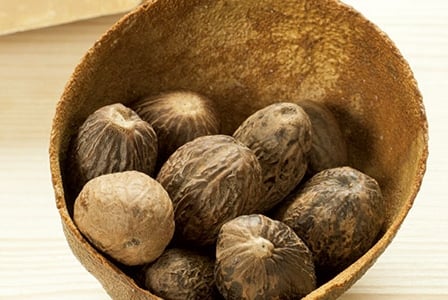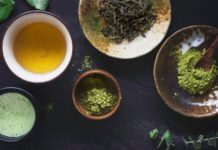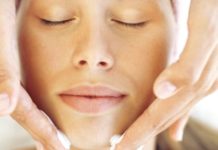
Has harsh winter weather robbed your skin of moisture? Shea butter\’s bioactive ingredients offer anti-inflammatory moisturizing benefits for your skin, hands, and hair.
Shea butter is extracted from the kernels of shea nuts. Traditionally used as an edible oil and medicine in Africa, where shea trees are grown, today it’s used as a cocoa butter substitute—and as an ingredient in skin care products. Shea butter provides soothing relief from the dryness of winter.
Winter dryness
The dry winter months can cause problems for our skin. Dry air can deplete our skin of moisture, causing cracking, chapping, and irritation. The sun can be just as damaging in the winter as it is in summer. The combination of dryness, cold temperatures, wind, and sun can take its toll.
According to Anne-Marie Martin, a holistic health practitioner, “Any part of the skin that isn’t protected from cold winds tends to be most affected.” The face and hands are typical problem areas when it comes to dry skin.
“The knees and elbows also tend to be particularly prone to dryness,” says Martin. Being indoors offers little reprieve, as many forced-air, centralized heating systems, at the workplace or at home, dry the skin further.
Other sources of dryness
Chemical-based cosmetic products may only exacerbate skin problems. Antibacterial or antimicrobial soaps often reduce the skin’s acidity, which protects the skin. Other soaps or alcohol-based lotions can also dry the skin. Avoid talcum powders, as talc may provide a breeding ground for yeast and has been linked to certain forms of cancer.
Shea butter benefits
Shea butter keeps our skin healthy in three ways, by
- acting as an emollient to soften and soothe dry skin
- reducing flaking and restoring suppleness to enhance the appearance of dry, damaged skin
- preventing water evaporation and plumping up skin cells by increasing their water content
Bioactive ingredients
Shea butter contains numerous bioactive ingredients such as vitamins A and E, essential fatty acids, and other phytonutrients essential to health. Shea butter contains compounds such as triterpene acetates and cinnamates, which a 2010 animal study showed to have significant anti-inflammatory and anti-tumour benefits for skin.
Refined or unrefined?
Shea butter is a popular ingredient in a number of skin care products. However, Martin stresses, when choosing a shea butter product, “the quality of shea butter is essential.”
Refined shea butter typically has a whiter, smoother texture than unrefined and doesn’t have shea butter’s natural aroma. Martin suggests using only grade A, unrefined shea butter—either raw or handcrafted—which will have a creamy pale yellow colour. Unrefined shea butter is also more grainy and harder than the refined butter, and will have a slightly nutty smell.
Natural moisturizer
Moisturizing is crucial to keeping skin soft, smooth, and healthy-looking. When moisturizing during the day, opt for light cremes and lotions containing shea butter. The best time to moisturize is after a bath or shower when the skin is still damp. “Shea butter will be quickly absorbed and won’t leave a greasy residue,” says Martin. “It leaves a protective film on the outer skin, which will protect it for hours at a time.”
Pre-shower
Martin recommends hydrating the skin by massaging first with organic, unrefined sesame oil, or a special Ayurvedic herbal oil called mahanarayan, before showering. Olive oil and coconut oil are also options for those who are sensitive to sesame oil. “These oils are natural skin cleansers and they prevent the skin from becoming dehydrated in the shower,” says Martin. ä
Hair care
Hair often gets damaged from dry winter air and sun. Shea butter’s light, nongreasy texture and exceptional moisturizing properties make it an ideal leave-in conditioner.
After shampooing, Martin recommends putting 1/4 to 1/2 tsp (1 to 2 mL) of shea butter in your hand, letting the body’s temperature naturally melt or soften the butter. Then apply it to the hair and scalp. “Cover the head with a towel and leave it in for about 20 to 30 minutes. Then remove the towel and gently comb the hair and style as desired,” she says.
Après shower
The best time to moisturize is after a bath or shower when the skin is still damp. “After the shower, within about three to five minutes, once the skin is dry but still moist, moisturize the skin with pure shea butter or shea lotion.”
Hand care
The hands are one of the most important areas to moisturize because they’re exposed to the elements. Frequent handwashing depletes the skin’s natural oils, leaving hands dry and rough. Avoid alcohol-based sanitizers, which leave the skin dry and aren’t as effective at killing viruses and bacteria as regular soap and water.
Martin also recommends investing in a pair of organic cotton gloves to put on at night after moisturizing. “It helps the skin retain and absorb moisture,” she says.
Shop for fair trade products
More than 4 million African women are employed throughout shea butter supply chains. In countries such as Burkina Faso, growing and harvesting shea nuts offers a means for reducing poverty in many developing communities that lack access to health and education.
Many shea butter products sold in Canada are sourced from Fairtrade certified cooperatives, which ensure producer communities receive fair prices and decent working conditions.
Buying Fairtrade certified shea butter ensures the product has been sourced in a fair and environmentally friendly manner, supporting the sustainability and growth of communities around the world.
Essential oils
Combine shea butter with essential oils such as lavender, palmarosa, geranium, or camomile. Add a few drops of your favourite essential oil to 1 to 2 Tbsp (15 to 30 mL) of shea butter to increase its healing benefits and create a soothing scent.


















